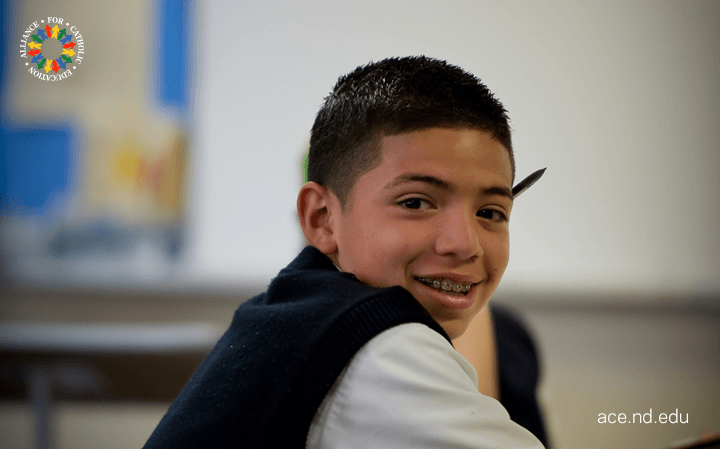One of my seventh-grade boys penned a unique Easter reflection after I asked my class to think about what they would ask or say to Jesus. We had just prayed the Stations of the Cross during Holy Week.
"Thank you for everything you did for us, especially die for us. Like dude, mad love for you. I would kiss him and treat him as my father. I might cry when I have to say goodbye."
Amid the chaos of Easter break and standardized testing that followed, I didn't find the time or sanity to read these reflections until two weeks later. I could clearly hear my student saying these words. He is a classic attention-seeker and has exercised my patience on more than one occasion. And yet, he also stops me in ways like this and poignantly, perfectly captures the idea of Christ for me.
I have been surprised by many things while serving as a teacher in ACE (such as the fact that I would have to plan weekly Masses, that some of my students were reading four grades below level, and that Fridays are always a challenge). But some of my favorite surprises are 1) how easily children love, and 2) how easy it was for me to fall in love with my students. Like dude, mad love for you.
Watching my almost-graduating eighth-graders shepherd their kindergarten buddies into Mass, I see these four- and five-year-olds latch on and not let go of their "guardian angels." They give their love so freely. I wonder: at what age will they start to hesitate to give love to others?
I see one of my students with her head bowed and held in her hands as she prays after receiving the Eucharist. Kindergarteners are climbing over pews around her, tearing pages out of the hymnals, and students are whispering slightly below a shout– yet she is a sea of calm. She is an island of peace, of time spent resting with God in the present moment.
In moments like these, I am filled with love for my students. When a boy whose handwriting is barely legible and whose thinking is often equally erratic gives not just a coherent, but an eloquent response to the toughest question on a test, I beam with pride. I even blurt it out loud to anyone who will listen. When someone has a hilarious exit ticket or a drawing that's museum-worthy, I want to show it to everyone (and sometimes hoard them on my desk). When the hardest-working student earns a full-ride scholarship to high school, I embarrass him daily by smiling at him during random moments in class and sneakily taking his picture at the awards ceremony.
This joy, gratitude, and amazement at being a witness to my students' "wild and precious" lives constantly makes me want to sing and dance (and sometimes I do, embarrassing them further #middleschool).
Over Easter, I stumbled across a fun fact about how the word "Hallelujah" in Hebrew is an imperative word (which my students will tell you from our grammar instruction means it gives a command #teachingmoment). Translated literally, it means, "you go praise the Lord." I asked my students how we can do that. How do we praise the Lord so people can see our joy at His Resurrection? Pray. Sing. Dance. Give. Worship. Love, they said.
As my two years serving in ACE wrap up and the school year winds down, I think about all that has happened and all that I've learned. Like my other ACE 22 cohort members, I responded to a call two years ago that I didn't fully understand. It made me think of the apostles after the Resurrection. They must have slowly begun to realize what it meant to "Go therefore and make disciples of all nations" (Matthew 28:19). It would mean sometimes having absolutely no clue what to do. It would mean feeling like a failure, too (more than once). Or it would involve finding yourself in a situation that has you looking at your hands, as if in slow motion, asking "how did I get here?"
But, like the apostles, if we persist and remain open to grace, at some point we see Christ transfigured. Sometimes it's in a student's transcendent insight. Sometimes, it's in a community member's humble, quiet, instinctive generosity when it's your turn to do the dishes, but you have report cards and parent-teacher conferences and papers to grade and an ACE reflection on your plate. Grace is there.
Coming to the end of an experience as formative and challenging as ACE, I find myself attempting to soak up as many of these moments as I can. Here's what I wish I could say to my students, their families, my fellow ACErs, my professors, my coworkers, and the ACE staff: thank you for everything you did -- like dude, mad love for you. And I might just cry when I have to say goodbye. Hallelujah.
Learn more about the ACE Teaching Fellows experience at ace.nd.edu/teach and request more information.
 Alliance for Catholic Education
Alliance for Catholic Education
